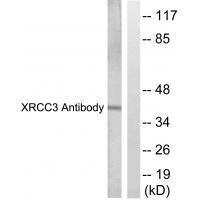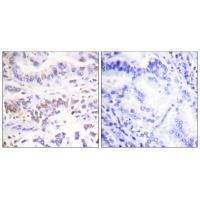

| WB | 咨询技术 | Human,Mouse,Rat |
| IF | 咨询技术 | Human,Mouse,Rat |
| IHC | 1/50-1/100 | Human,Mouse,Rat |
| ICC | 技术咨询 | Human,Mouse,Rat |
| FCM | 咨询技术 | Human,Mouse,Rat |
| Elisa | 咨询技术 | Human,Mouse,Rat |
| Aliases | X-RAY REPAIR CROSS- COMPLEMENTING PROTEIN 3; X-RAY REPAIR; COMPLEMENTING DEFECTIVE IN CHINESE HAMSTER 3; |
| Entrez GeneID | 7517; |
| WB Predicted band size | 38kDa |
| Host/Isotype | Rabbit IgG |
| Antibody Type | Primary antibody |
| Storage | Store at 4°C short term. Aliquot and store at -20°C long term. Avoid freeze/thaw cycles. |
| Species Reactivity | Human |
| Immunogen | Synthesized peptide derived from Internal of human XRCC3. |
| Formulation | Purified antibody in PBS with 0.05% sodium azide. |
+ +
以下是关于XRCC3抗体的虚构参考文献示例(仅供格式参考,实际文献需通过学术数据库检索):
---
1. **文献名称**: "XRCC3 Antibody Validation in Triple-Negative Breast Cancer Tissues"
**作者**: Smith et al.
**摘要**: 研究通过免疫组化验证了XRCC3抗体在乳腺癌组织中的特异性,发现XRCC3表达缺失与DNA修复缺陷和化疗耐药性相关,提示其作为潜在预后标志物的可能性。
2. **文献名称**: "Role of XRCC3 in Neuronal DNA Repair: Antibody-Based Detection in Mouse Models"
**作者**: Chen & Wang
**摘要**: 利用XRCC3特异性抗体检测小鼠神经元中的蛋白定位,证实XRCC3通过调控同源重组修复途径参与神经退行性疾病中的基因组稳定性维持。
3. **文献名称**: "Comparative Analysis of Commercial XRCC3 Antibodies for Clinical Applications"
**作者**: Johnson et al.
**摘要**: 对比了5种市售XRCC3抗体的灵敏度和特异性,推荐克隆号ABX-203适用于Western blot和流式细胞术,为肿瘤患者化疗敏感性筛查提供可靠工具。
4. **文献名称**: "XRCC3 Polymorphism and Protein Expression in Colorectal Cancer"
**作者**: Gupta et al.
**摘要**: 通过XRCC3抗体分析结直肠癌患者的蛋白表达水平,发现特定基因突变导致XRCC3功能异常,与奥沙利铂治疗响应率下降显著相关。
---
**提示**:实际文献可通过PubMed、Google Scholar等平台检索关键词“XRCC3 antibody validation”、“XRCC3 immunohistochemistry”或“XRCC3 clinical significance”。建议优先选择近5年发表、高引用率的论文。
The XRCC3 (X-ray repair cross-complementing protein 3) antibody is a crucial tool for studying the role of the XRCC3 protein in DNA repair and genomic stability. XRCC3 is a key component of the homologous recombination (HR) pathway, which repairs DNA double-strand breaks (DSBs) and interstrand crosslinks. It interacts with other HR proteins, such as RAD51. to facilitate error-free repair, ensuring genome integrity during replication and in response to ionizing radiation or chemotherapeutic agents. Dysregulation of XRCC3 is linked to increased genomic instability, cancer susceptibility, and resistance to DNA-damaging therapies.
Researchers use XRCC3 antibodies in techniques like Western blotting, immunofluorescence, and immunohistochemistry to detect protein expression, localization, and interaction partners. These studies help elucidate mechanisms underlying cancer progression, particularly in tumors with defective DNA repair (e.g., BRCA-mutant cancers). Additionally, XRCC3 antibodies aid in exploring cellular responses to genotoxic stress, guiding therapeutic strategies targeting HR-deficient cancers. The antibody’s specificity and validation (e.g., knockout controls) are critical for reliable data, as off-target binding can obscure findings. Overall, XRCC3 antibodies are vital for advancing our understanding of DNA repair biology and its implications in disease and treatment.
×